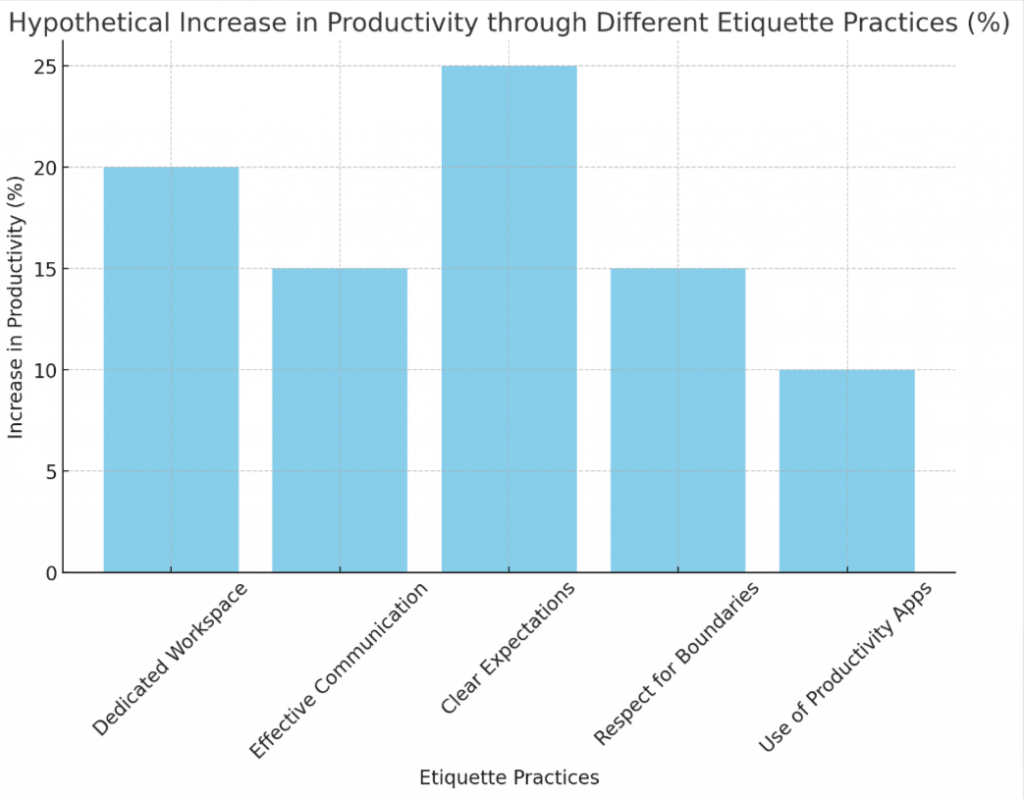Upholding Professionalism: Work-from-Home Etiquette in Social Media Jobs
Working remotely in social media jobs can pose unique challenges when it comes to maintaining professional etiquette. In fact, 83% of employers have found the shift to a remote work model successful, highlighting its relevance today more than ever.
This blog aims to guide you through these hurdles by providing practical tips on establishing a productive and respectful digital workspace. Ready for insight that could elevate your work-from-home experience? Let’s dive in!
Key Takeaways
- Creating a dedicated and clutter – free workspace at home is essential for boosting productivity in social media jobs.
- Effective communication, including respecting time zones and using appropriate communication channels like Zoom, plays a key role in maintaining professionalism in remote work.
- Setting clear expectations, such as deadlines and deliverables, helps prevent misunderstandings and ensures focus and productivity in social media jobs.
- Working during your most productive hours, regularly interacting with your team, and utilizing productivity applications can enhance efficiency in social media jobs.
The Importance of Etiquette in Remote Work
Embracing etiquette in remote work plays a significant role in maintaining trust and respect between managers and employees. It’s not just about manners; it lays the foundation for effective communication, improved collaboration, whole-team cohesion, and strengthened remote work relationships.
Remote work etiquette is vital to cultivate a professional workspace that fosters mutual respect among co-workers.
Effective digital etiquette elevates your e-reputation while promoting positive vibes within the virtual office environment. When you respect time zones, maintain clear communication expectations, and exhibit cultural sensitivity, you create an atmosphere conducive for productivity.
This disciplined approach boosts professionalism even outside traditional office settings. A healthy company culture thrives on such principles as setting boundaries for a balanced work-life equilibrium – all credits to observing proper remote working tips.
Key Elements of Work-from-Home Etiquette
Creating a professional workspace, maintaining effective communication, and finding a healthy work-life balance are essential elements of work-from-home etiquette.
Creating a Professional Workspace
Constructing a professional workspace at home can significantly boost your productivity and focus. Such an area puts you in the mindset that you’re indeed on work mode despite being at home.
This space should be free of clutter, distractions, and has all the necessary tools for your job.
Lighting plays a crucial role in creating an efficient work environment. Natural light is beneficial for reducing eye strain when looking at computer screens. Furthermore, investing in ergonomic furniture such as adjustable chairs and desks promotes good posture during long hours of remote work.
Beyond boosting comfort levels, it communicates professionalism during video conferences with colleagues or clients.
A dedicated workspace also ensures privacy during working hours — one aspect of maintaining positive remote work etiquette that not only respects employees’ boundaries but also guards company reputation.
As part of establishing this professional atmosphere, technology requirements must always be met: reliable internet connection, functional laptop or personal computer, essential software programs like Zoom or Teams for seamless collaboration and communication among team members.
Effective Communication
Effective communication plays a pivotal role in promoting a healthy remote work environment. It’s more than just clear and concise messages; it involves understanding the cultural sensitivity, mindfulness of time zones, and respect for off-hours time.
Video-conference etiquette highlights the importance of minimizing distractions during virtual meetings and maintaining professionalism even when you’re not in a physical office setting.
Trust between colleagues strengthens with effective communication. Managers become assured of their team’s accountability and commitment to high-performance standards that leads to improved collaboration.
A mindful approach towards ensuring privacy while conducting casual calls with team leaders can also lay foundations for stronger professional relationships. This approach emphasizes on collaboration software such as Teams or Zoom interventions for fostering smooth interactions among virtual teams in today’s global workforce landscape.
Maintaining a Healthy Work-Life Balance
Setting boundaries represents a cornerstone of maintaining a healthy work-life balance and contributes to workplace etiquette in remote social media jobs. Boundaries prevent burnout by ensuring workers do not overcommit, thus achieving an equilibrium between job demands and personal life needs.
The practice also fosters space for self-care, allowing time for physical fitness, mental health activities, or simply the pursuit of hobbies independent from work.
Adhering to these protective limits requires discipline as well as company support and understanding. This mutual respect safeguards employee privacy, allowing their personal life to remain separate from professional responsibilities.
Ultimately this type of supportive environment cultivates trust among team members and reinforces the value that while productivity is vital, so too is individual wellbeing.
Avoiding Common Remote Work Pitfalls
To avoid common remote work pitfalls, it is important to follow certain guidelines. These include:
- Creating a designated workspace that is separate from your personal living area.
- Establishing a daily routine and sticking to a regular work schedule.
- Minimizing distractions by turning off notifications and finding a quiet environment.
- Setting clear goals and deadlines for each task or project.
- Taking regular breaks to recharge and avoid burnout.
- Communicating regularly with your team members to stay connected and aligned.
- Using technology tools and applications to streamline communication and collaboration.
- Avoiding multitasking and focusing on one task at a time for better productivity.
- Practicing good time management skills by prioritizing tasks and avoiding procrastination.
- Seeking support or assistance when needed, rather than struggling alone.
Etiquette in Social Media Jobs
Choosing the right communication channel, such as Zoom, respecting time zones and off-hours, and clear communication of expectations are key elements of etiquette in social media jobs.
Choosing the Right Communication Channel
Choosing the right communication channel is crucial in social media jobs that require remote work etiquette. By selecting the appropriate platform, you can effectively communicate with your team members and ensure seamless collaboration.
Consider factors such as the nature of your message, urgency, and privacy requirements when deciding on a communication channel. Adhering to remote work etiquette improves overall communication and enhances productivity among team members.
So make sure to choose wisely for efficient and professional interactions.
Zoom Etiquette Tips
Maintain professionalism during Zoom meetings with these etiquette tips:
- Dress appropriately for the meeting.
- Find a quiet and well – lit location for your video call.
- Test your audio and video before joining the meeting.
- Mute yourself when you are not speaking to minimize background noise.
- Avoid distractions by closing unnecessary tabs and applications on your computer.
- Pay attention and actively participate in the conversation.
- Use the chat feature for non – verbal communication or to ask questions.
- Keep your camera on unless there is a valid reason to turn it off.
- Respect others’ time by being punctual for scheduled meetings.
- Be mindful of your body language and facial expressions during the call.
Respecting Time Zones and Off-Hours
Respecting time zones and off-hours is essential in social media jobs that involve remote work. Understanding and acknowledging the different time zones of team members ensures effective communication and collaboration across the globe.
By being mindful of off-hours, you show respect for your colleagues’ personal lives and allow everyone to maintain a healthy work-life balance. This includes avoiding unnecessary late-night or early-morning messages unless it’s an urgent matter.
Adhering to proper etiquette regarding time zones and off-hours helps foster a positive remote work environment where everyone feels supported and valued regardless of their location.
Clear Communication of Expectations
One key element of work-from-home etiquette in social media jobs is clear communication of expectations. It is crucial to clearly communicate your expectations with your team and clients to ensure that everyone is on the same page.
When there is a lack of clarity, misunderstandings can arise, leading to delays, errors, and frustration. By setting clear expectations from the start, you can help maintain focus and productivity in remote work environments.
This includes being specific about deadlines, deliverables, and desired outcomes. Openly discussing goals and objectives will help create a positive remote work culture where everyone understands what needs to be achieved and can work towards it efficiently.
Enhancing Productivity in Social Media Jobs
Social media professionals can boost their productivity by working during their most productive hours, regularly interacting with their team, using productivity applications, and setting boundaries with others.
Discover more tips to enhance productivity in social media jobs here!
Working During Most Productive Hours
Working during your most productive hours can significantly enhance productivity in social media jobs that require remote work. By identifying the time of day when you’re most alert and focused, you can optimize your performance and accomplish tasks more efficiently.
Research shows that individuals have different peak periods of cognitive function, which is why it’s essential to identify yours. When you align your work schedule with these productive hours, you’ll experience increased concentration, creativity, and overall job satisfaction.
By taking advantage of this flexibility offered by working from home, you can maximize your output while maintaining a healthy work-life balance.
Regular Interaction with Team
Regular interaction with your team is crucial for enhancing productivity in social media jobs. By maintaining consistent communication, you can stay connected and feel like part of the larger operation.
Regularly interacting with your team helps improve collaboration and fosters a positive remote work environment. It allows you to share ideas, brainstorm solutions, and provide support when needed.
Utilizing technology tools such as Slack or Zoom can help facilitate effective communication with colleagues, regardless of physical distance. So make it a priority to maintain regular interaction with your team to cultivate strong working relationships and maximize productivity in your social media job.
Use of Productivity Applications
Productivity applications can significantly enhance productivity in social media jobs. They provide efficient tools and features that help streamline tasks, improve organization, and boost collaboration. Here are some ways to leverage productivity applications for better work-from-home efficiency:
- Task Management: Utilize applications like Trello or Asana to create and assign tasks, set deadlines, and track progress. This ensures that everyone on the team is aware of their responsibilities and helps prioritize work.
- Communication: Tools like Slack or Microsoft Teams facilitate real-time communication, allowing for quick updates, file sharing, and easy collaboration with team members. Clear communication is essential for remote teams to stay connected and productive.
- Time Tracking: Use time-tracking apps such as Toggl or RescueTime to monitor how you spend your time throughout the day. This helps identify time-wasting activities and enables you to make adjustments for better productivity.
- Project Collaboration: Platforms like Google Drive or Dropbox allow seamless collaboration on documents, presentations, and spreadsheets. Multiple team members can work simultaneously on a single file, eliminating version control issues.
- Workflow Automation: Explore automation tools like Zapier or IFTTT that automate repetitive tasks by integrating different applications together. This saves time and allows you to focus on more important aspects of your work.
- Virtual Meetings: Video conferencing platforms such as Zoom or Google Meet enable face-to-face meetings with colleagues or clients regardless of location. They provide essential features like screen sharing, recording capabilities, and chat functions for effective virtual collaboration.

Setting Boundaries with Others
Setting boundaries with others is crucial in social media jobs to maintain productivity and a positive work environment. By clearly communicating your expectations, you can establish guidelines for collaboration and ensure that everyone respects each other’s time and workload.
Setting limits on when and how often team members can contact you outside of working hours helps prevent burnout and maintains a healthy work-life balance. Additionally, by setting boundaries with clients or external parties, you can manage their expectations and avoid overcommitting yourself or your team.
Respecting these boundaries fosters professionalism and allows everyone to focus on their tasks effectively without unnecessary distractions or disruptions.
How to Maintain Professionalism while Working Remotely
Maintaining professionalism is crucial for establishing trust and commitment in remote social media jobs. To ensure professionalism while working remotely, it is essential to create a dedicated workspace that promotes focus and productivity.
Clear communication with colleagues should be maintained through appropriate channels such as email, phone or video calls, and messaging tools. It is important to respect time zones and off-hours to avoid disrupting colleagues’ personal lives.
Setting clear expectations for communication and work deliverables helps maintain professionalism and ensures efficiency. By adhering to these guidelines, remote workers can establish themselves as reliable professionals in virtual environments.
Conclusion
In conclusion, practicing work-from-home etiquette is crucial for social media jobs. By choosing the right communication channel, respecting time zones, and maintaining clear expectations, professionals can enhance productivity and maintain professionalism while working remotely.
Employing these etiquette practices creates a positive remote work environment that fosters effective collaboration and communication among team members. So remember to prioritize etiquette in order to succeed in social media jobs from the comfort of your own home.

